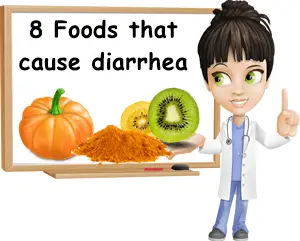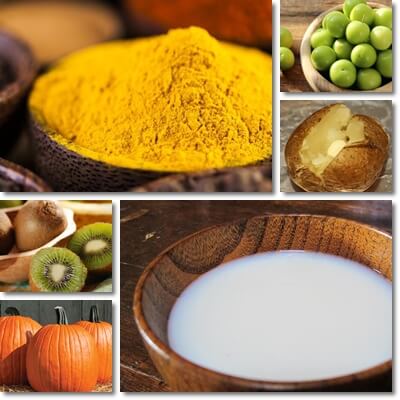Of the two main types of diarrhea, infectious and non-infectious, the latter is quite elusive. There are the obvious trigger-foods for non-infectious diarrhea such as regular milk and most dairy in lactose intolerance, gluten in gluten sensitivity, celiac disease and wheat allergy, FODMAPs such as the sugar fructose, fructans and sugar alcohols xylitol, sorbitol, mannitol and maltitol in fructose intolerance or IBS, and the all-time laxative, caffeine. B
ut what about the less obvious foods that cause loose stools and diarrhea without there necessarily being an underlying medical condition that triggers it? If you too have been experiencing loose stools every now and then, but couldn’t quite put your finger on it, take a look at these 8 surprising foods that can cause diarrhea:
1) Pumpkin, roasted, with rind
When you look at its nutritional value, pumpkin in general provides between 5 and 8 g of carbs of which 1.1 – 2.8 g dietary fiber, 2 – 3.2 g sugar and the remaining other types of carbohydrates. It seems like an okay amount of carbs, fiber and sugar per 100 g serving. But say you eat roasted pumpkin, flesh and rind, and have a whole wedge which is a perfectly okay amount. Not only do you eat a lot more than 100 g, but the roasting keeps pumpkin flesh in long streaky fibers meaning the dietary fiber isn’t quite as well broken down as from boiling.
Roasting further makes the rind soft and edible (that is, if it doesn’t get burnt), adding to the fiber intake. See the benefits of pumpkin rind. If you do happen to eat a wedge or two of delicious roasted pumpkin, with rind, don’t be surprised if you have a loose stool or diarrhea the next morning. Especially if you’re not that friendly with fiber.

2) Lard
If you’ve never had lard, then it might come as a surprise to know that it can and does cause diarrhea. Fat in general helps smooth things along and contributes to regular and easy bowel movements. And lard is a great example of this effect on the digestive system. Eating melted lard on bread (just saying: don’t dismiss it until you’ve tried it), or baked goods made with lard (e.g. sweet and savory pies, pastry) can send you to the bathroom in a few hours.
Of course, effects are directly proportional with intake.
3) Buttermilk and soured milk
It’s well-known that lactose is a sugar in sweet milk and dairy that causes primarily digestive symptoms in those with varying degrees of lactose intolerance.
But both buttermilk (the remaining liquid left over after churning whole milk for the purpose of making butter) and soured milk (that is, acidified milk) don’t have any lactose. The acidification process they go through causes naturally-occurring or cultured lactic acid bacteria to turn the sugar lactose into lactic acid.
Yet both buttermilk and soured milk cause loose stools and diarrhea. In this case, the culprit is not lactose intolerance, seen that they do not contain lactose, but rather the probiotic properties of the two types of milk (after all, they contain live, beneficial bacteria).
Find out more about the health benefits of buttermilk and the health benefits of soured milk for bowel habits regulation, optimization of digestion and nutrient absorption, metabolism and more aspects of health, and learn how the old, artisanal vs modern, commercial variants compare.
4) Unripe or underripe fruits, with water
So many people are intolerant of unripe or not yet fully ripe fruits and experience stomach upset if they eat them at this point in their ripening stage. Side effects range from sour stomach and stomach pain, heartburn, burping and bloating to loose stools and diarrhea. The symptoms tend to be worse if you have unripe or underripe fruits on an empty stomach, and drink water with them.
Fruits likely to cause such effects are typically fruits higher in pectin such as apples, pears, plums and rose hips, but also other types of fruits such as bananas or kiwifruit. Fruits such as apricots, peaches, pears, plums etc. also contain sugar alcohols that could trigger FODMAP-related digestive upset, including loose stools and diarrhea.

5) Kiwifruit, fresh and dried, with water
One of the best natural solutions for relieving constipation, aside from dried plums, aka prunes, is kiwifruit and water. Eating a few fresh kiwifruit, or dried, and drinking a big glass of water on an empty stomach in the morning is a simple and often times effective remedy for constipation. To get the most benefits, you should eat the kiwifruit whole, fruit pulp, seeds and skin.
The fiber in the seeds and skin is quite effective at setting the bowels into motion, so effective that it can result in urgent trips to the bathroom, with loose effects.
6) Pepper (and other spices)
Eating pepper can cause loose stools and diarrhea, but not the usual pinch or two of pepper one typically adds to food for flavor. Particularly spicy dishes containing enough pepper to really feel the burn in the mouth and throat and, later on, in the chest as heartburn can cause loose stools and diarrhea, in addition to indigestion, nausea, vomiting, reflux and stomach pain.
The reason behind this side effect: pepper is an irritant of the sensitive mucous linings of the gastrointestinal tract, but only above a certain intake side effects occur. That intake is determined by individual tolerance to the active components in the spice. Others spicy foods such as hot peppers and hot paprika, horseradish or wasabi can have the same irritant effects.
Also see these 7 side effects of hot chili peppers.
7) Turmeric
Turmeric is an excellent anti-inflammatory and anti-arthritic food with antioxidant, free radical-scavenging properties, neuroprotective and even antitumor activity. But did you know the same biologically active components in turmeric that provide it with its wonderful benefits are also the main source of its side effects? Eating turmeric above a certain intake or too frequently, or taking turmeric or curcumin supplements for arthritis joint pain and swelling or other ailments, while effective, can cause severe digestive upset with symptoms such as heartburn, acid reflux and loose stools and diarrhea and even allergic reactions?
Find out these 5 reasons turmeric is bad for you.
8) Potatoes
Did you know that eating potatoes can cause loose stools and diarrhea? Some people are more likely to experience this side effect as a result of eating potatoes. The likely culprits are naturally-occurring glycoalkaloids which, while toxic, are not absorbed during digestion, but still manage to irritate the gastrointestinal tract enough for the body to rush them out by causing diarrhea. If you get diarrhea from eating potatoes, it’s likely a protective reflex and means that you are more sensitive to the naturally-occurring toxins in the tuberous vegetables. Some people exhibit similar symptoms when they also eat eggplants and tomatoes, unripe green tomatoes in particular. The glycoalkaloids in potatoes act as pesticides, insecticides and fungicides and are a natural defense system of the vegetable.
